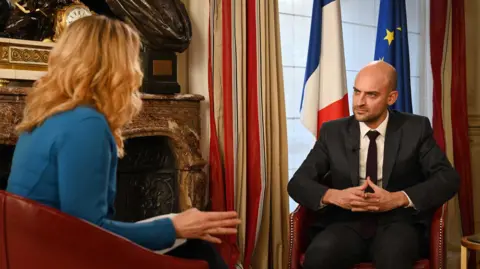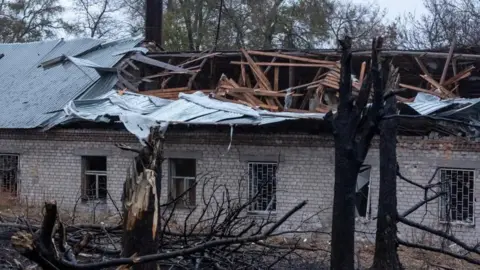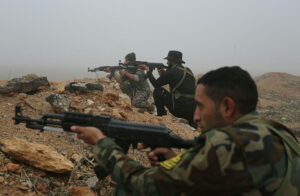There are no “red lines” when it comes to support for Ukraine, the French Foreign Minister has told the BBC.
Jean-Noël Barrot said that Ukraine could fire French long-range missiles into Russia “in the logics of self defence”, but would not confirm if French weapons had already been used.
“The principle has been set… our messages to President Zelensky have been well received,” he said in an exclusive interview for Sunday with Laura Kuenssberg.
French President Macron indicated France’s willingness to allow its missiles to be fired into Russia earlier this year. But Barrot’s comments are significant, coming days after US and UK long-range missiles were used in that way for the first time.
Barrot, who held talks with Foreign Secretary David Lammy in London on Friday, said Western allies should not put any limits on support for Ukraine against Russia, and “not set and express red lines”.
Asked if this could even mean French troops in combat he said: “We do not discard any option.”
“We will support Ukraine as intensely and as long as necessary. Why? Because it is our security that is at stake. Each time the Russian army progresses by one square kilometre, the threat gets one square kilometre closer to Europe,” he said.
Barrot hinted at inviting Ukraine to join Nato, as President Zelensky has requested. “We are open to extending an invitation, and so in our discussions with friends and allies, and friends and allies of Ukraine, we are working to get them to closer to our positions,” Barrot said.
And he suggested that Western countries will have to increase the amount they spend on defence, remarking: “Of course we will have to spend more if we want to do more, and I think that we have to face these new challenges.”

Barrot’s comments come after a week of significant escalation in Ukraine – with UK and US long-range missiles being fired in Russia for the first time, Russia firing what it said was a new type of missile and Vladimir Putin suggesting the possibility of global war.
One UK government source describes the moment as “crunch point” ahead of the winter, and ahead of Donald Trump’s return to the White House.
But how should Ukraine’s allies respond to Putin’s threats and Ukraine’s increasingly perilous position? I’ve been speaking to sources inside and outside of the UK government to understand what the next steps might be.
What’s next for the West?
Top of the list is to keep the money and military support flowing. “I’d turn up with a trebling of European money for Ukraine and I’d go after Russian assets,” one source said. “We need to work out what is the war chest that Ukraine needs to find to fight through 2025 and into 2026 – it’s hard to ask the US taxpayer to foot the bill.”
It’s not surprising there’s a strong feeling in the defence world that increasing defence budgets is part of the answer. The head of the military, Admiral Sir Tony Radakin, who visited President Zelensky this week, told us a fortnight ago that spending had to go up.
But with money tight, and the government reluctant even to set a date on hitting its target of spending 2.5% of GDP on defence, there is little chance of sudden injections of extra billions.
Government sources emphasise long-term commitments the UK has already made, particularly supporting Ukraine with drones.
Intelligence we can reveal this weekend shows Ukraine used drones in mid and late September to hit four Russian ammunition depots, hundreds of miles from Ukraine. The attacks are understood to have successfully destroyed the biggest amount of Russian and North Korean supplied ammunition during the conflict so far. It hasn’t been confirmed whether these drones were provided by the UK or others.
They also highlighted a treaty signed between the UK and Ukraine in July to help the country arm itself in the long term.
Putin says Russia will use new missile again in ‘combat conditions’
Steve Rosenberg: After days of escalation, what will Putin do next?
What we know about Russia’s Oreshnik missile
What about responding to Putin’s increasingly threatening rhetoric? The message from multiple sources is: don’t panic.
One said: “The whole way through he has made threats – we have to not let it deter us”. What’s different now, according to one former minister, is that Putin’s comments are designed to catch the ear of the president-elect. “Russia wants to help Trump with reasons to switch off the help”. If it sounds like the conflict is becoming intolerably dangerous, perhaps the next President will be more eager to bring it to an end.
When it comes to the next President, there is nervous pause while Trump’s plan remains unclear. The hope is to put Ukraine in the best possible position for any negotiation, several sources said, and an insider advising the government told me that might involve bigging up Trump’s own negotiation ability. “To get [Trump] into frame of mind where it is one that is good for Ukraine – so he looks like the guy who stopped the war not the guy that lost Ukraine.”

In private there are also suggestions of getting Ukraine to consider what might be an acceptable way out of the conflict. In public, ministers will always say Russia should not be rewarded for an illegal invasion and that it is for Ukraine, and Ukraine alone to decide if and when to negotiate and whether to offer any compromise whatsoever.
But a source acknowledges that in government there’s an awareness that “every negotiation has to involve trade offs.”
“We have to think about what could be the quid pro quo for Ukraine,” a former minister says. “If [Zelensky] were to concede, what does he get? Does he get NATO membership to guarantee security in the long term?”
There is also is a realisation that the threat from Russia is here to stay – whether in Ukraine or attempted sabotage in our streets. “They are literally allied with the North Koreans fighting now, and the Iranians are supplying them,” a government source said. “We can’t see them as anything other than a threat now.”
Perhaps the reality is a more permanent threat on the eastern fringes of Europe. Perhaps Russia’s aggression and dangerous alliances are a return to the norm after a brief positive spell during the 90s. “Get used to it,” one source said, “it’s how we’ve lived for ever.”




